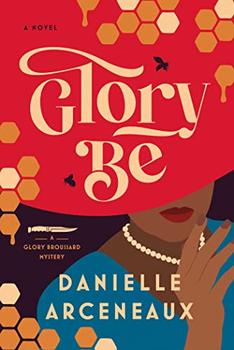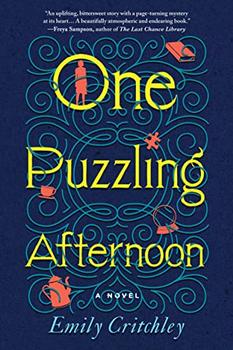Summary | Excerpt | Reviews | Beyond the book | Read-Alikes | Genres & Themes | Author Bio

A Glory Broussard Mystery
by Danielle ArceneauxWith acerbic wit and more than a touch of world weary wisdom, author Danielle Arceneaux has created a wonderful new voice in the world of the armchair sleuth. In this cozy-adjacent mystery, Glory is a cantankerous, ornery character who lacks the more traditional cozy traits — owning a quaint cupcake shop or running the local library — and instead harbors an interest in shady off-track gambling, hoarding tendencies, and a large serving of side-eye for anyone who's wearing shoes in the house.
Glory is a woman of contradictions, and it's those contradictions that make this such a refreshing read. Passing judgment on the new barista at her favorite coffee shop when he doesn't make her order fast enough, even as she's running an illegal gambling operation from a corner table. Endlessly proud of her overachieving attorney daughter, while silently casting aspersions on her decision to marry a white man and move across the country.
These characteristics make Glory relatable, easy to love and empathize with. Just as she begins to frustrate with her petty prejudices and cutting remarks, we are given a window into where her feelings of inadequacy and bitterness come from, and instead of getting angry, we find ourselves understanding her hurt. Arceneaux deftly reminds the reader of how her judgments were born, how someone so often brutally punched down by life and circumstances cannot help but want to punch back. Glory is used to having the worst thought of her because of her race and precarious economic situation. However, finding herself investigating a friend's murder provides a new way to channel that pent-up rage and lets her use the very conditions that cause her so much pain to find the killer. Being overlooked makes it that much easier to access places in which a more conspicuous detective would stand out. Her harmless "little old lady" exterior also lulls suspects into a false sense of security and makes them that much more likely to let vital clues slip.
Arceneaux plants Glory in a fully realized and finely detailed world. Just like the main character, the book's Louisiana setting is a place of contradictions. The hot and heavy air of a late summer slowly fades into a darker, colder autumn. A sultry sun trades places with a desolate gray sky. Beautiful hundred-year-old homes exist alongside the grim wreck of a stolen car. Melancholy scenes of Glory's daughter Delphine trying to help her mother clean her condemned house before inspectors arrive are juxtaposed with the two women investigating the elite Pelican Club, a storied country club that only started admitting African Americans in 1979.
It is that grueling journey between two worlds that struck me the hardest reading this book. As she struggles with untreated depression and seemingly insurmountable loss, Glory is also constantly fighting against forces that want to prevent her from ever digging out of that darkness. No matter how many church socials she volunteers for, the women of the congregation continue to see her as a useless meddler. She is powerless to stop the city from trying to evict her from her home. Her own daughter rolls her eyes at any advice she offers. For every battle Glory seems to win, there is always a bigger war on the horizon.
Arceneaux explores the marginalization of women, and specifically Black women, to great effect throughout the narrative by way of Glory's daily struggles and those of the supporting characters. In Delphine, we see a Black woman who has found professional success and married into a wealthy white family but still finds herself held to impossible standards by people who seem almost eager to see her misstep. The secondary character of Sister Josephine, a nun in Glory's parish who was forced into the sisterhood against her will, shows the reader a woman whose agency has been stripped from her, who is slotted into her role in life with no consideration for her desires or needs. Each of these women is fighting to regain a sense of self and to be seen for who she truly is, and each expresses that longing in a different way. Their frustrations and rage are palpable through Arceneaux's writing, making them impossible to forget.
This is very much a character-driven story and the narrative does sometimes suffer as a result. Though it moves at a thrilling clip from church meetings to illicit evenings in grimy local nightspots, it is occasionally difficult to keep up with Glory's chaotic detecting attempts. It certainly makes sense that a woman with no obvious investigative skills is going to be flying by the seat of her pants while she tries to solve a murder, but it can be difficult to work out how we got from point A to point B. The same holds for the shifting points of view throughout. Though Arceneaux is wonderful at giving Glory, Delphine, and several supporting characters clear and distinct voices, I did find myself losing track of exactly who was speaking more than once.
Regardless, this is a delightful and sometimes deeply moving addition to the wide, well-tilled field of mystery novels. Glory is a detective to keep an eye on, partly because she might swipe that paperweight on your desk, but also because I am dying to know what she will uncover next.
![]() This review
first ran in the January 10, 2024
issue of BookBrowse Recommends.
This review
first ran in the January 10, 2024
issue of BookBrowse Recommends.

If you liked Glory Be, try these:

by Richard Osman
Published 2025
Solving murders. It's a family business.

by Emily Critchley
Published 2023
A mystery she can't remember. A friend she can't forget.
Your guide toexceptional books
BookBrowse seeks out and recommends the best in contemporary fiction and nonfiction—books that not only engage and entertain but also deepen our understanding of ourselves and the world around us.